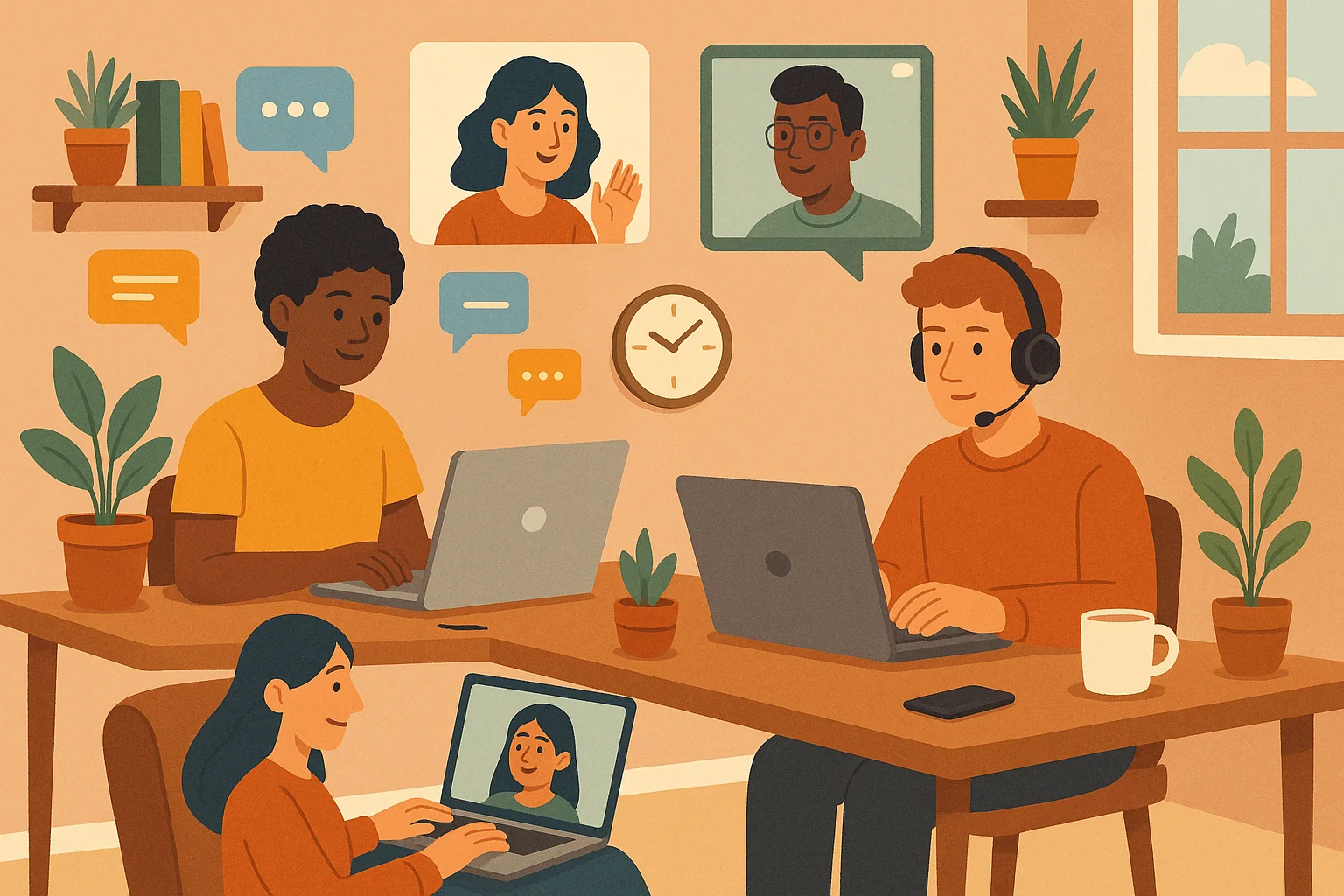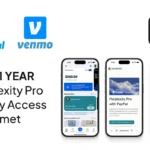Now Reading: Top 7 Remote Job Interview Tips That Will Help You Land Your Dream Position
-
01
Top 7 Remote Job Interview Tips That Will Help You Land Your Dream Position
Top 7 Remote Job Interview Tips That Will Help You Land Your Dream Position

Sitting in your home office, staring at your webcam, and waiting for that interview to begin can be nerve-wracking. I’ve been there, and I know the unique challenges that come with remote job interviews. That’s why I’ve compiled these proven remote job interview tips for applicants-to help you navigate the virtual interview landscape with confidence and showcase your best professional self.
Key Takeaways
What are the top tips for remote job interviews?
- Test your technology thoroughly before the interview to avoid technical glitches
- Create a professional, distraction-free environment with good lighting
- Practice looking at the camera (not the screen) to maintain virtual eye contact
- Dress professionally from head to toe for confidence and preparedness
- Prepare thoroughly by researching the company and practicing responses
- Demonstrate your remote work skills through clear communication and problem-solving examples
- Follow up professionally after the interview to reinforce your interest
Prepare Your Technology
Nothing derails a remote job interview faster than technical difficulties. As someone who’s experienced the panic of a failing connection mid-interview, I can tell you that thorough preparation is essential.
Test Everything in Advance
Set aside time at least 30 minutes before your interview to ensure all your technology is functioning properly. This isn’t just about turning on your computer-it’s about creating a seamless experience that allows you to focus on the conversation, not troubleshooting.
“Sit down at your desk 30 minutes before the interview and make sure all your tech is running smoothly. Test your webcam, microphone, and so on,” advises remote work experts.
Here’s my pre-interview tech checklist:
- Check your internet connection stability by running a speed test
- Test your webcam and microphone with the specific platform you’ll be using
- Ensure your device is fully charged and keep the charger nearby
- Close unnecessary applications that might slow down your computer or cause notifications
- Download any required software well in advance of the interview
- Have a backup plan ready, such as a phone number to call if technical issues arise
Master the Platform
Each video conferencing platform has its own quirks and features. Whether it’s Zoom, Microsoft Teams, Google Meet, or another platform, take time to become familiar with its interface.
“Practice using the tech the interviewer uses,” is crucial advice for remote job seekers. This familiarity will help you appear more professional and confident during the interview.
Learn how to:
- Mute and unmute yourself quickly
- Turn your camera on and off
- Share your screen (if needed for the interview)
- Use the chat function
- Adjust your video and audio settings
- Join a waiting room if the platform uses one
Useful Articles:
Create a Professional Environment
Your interview environment speaks volumes about your professionalism and attention to detail. I’ve seen candidates lose opportunities simply because their surroundings created a negative impression.
Set Up Your Space
Choose a quiet, well-lit location for your interview. The goal is to create a space that minimizes distractions and presents you in the best possible light.
“Have a clean, uncluttered background,” is essential advice from Harvard Business Review. Your environment should enhance your professional image, not detract from it.
Consider these elements when setting up your space:
- Lighting: Position yourself facing a window for natural light or use a ring light to illuminate your face evenly
- Background: Choose a neutral, uncluttered background or use a simple virtual background if necessary
- Seating: Use a comfortable chair that allows you to sit up straight
- Camera angle: Position your camera at eye level (use books or a stand if needed)
- Sound: Find a quiet location and consider using headphones to improve audio quality
Minimize Distractions
Even the most understanding interviewer can be put off by constant interruptions. Take proactive steps to create a distraction-free environment.
“Limit distractions,” is crucial advice for remote interviews. This shows respect for the interviewer’s time and demonstrates your ability to manage your remote work environment.
Before your interview:
- Inform household members about your interview time
- Place pets in another room
- Turn off notifications on all devices
- Close doors and windows to minimize background noise
- Have water nearby but avoid eating during the interview
- Turn off your phone or put it on silent mode
Master Your Presentation
How you present yourself virtually requires specific techniques that differ from in-person interviews. I’ve found that candidates who understand these nuances often outperform equally qualified applicants.
Perfect Your Virtual Body Language
Body language matters even when you’re not in the same room as your interviewer. In fact, it becomes even more important as the interviewer has fewer cues to interpret.
“Practice using professional body language,” is advice that can set you apart. Your posture, facial expressions, and gestures all contribute to how you’re perceived.
Focus on these aspects of virtual body language:
- Sit up straight with your shoulders back
- Smile naturally throughout the conversation
- Nod occasionally to show you’re listening
- Use hand gestures sparingly and keep them within the frame
- Avoid fidgeting or making distracting movements
- Lean slightly forward to show engagement
Master Eye Contact
One of the most challenging aspects of remote interviews is maintaining eye contact. The natural tendency is to look at the interviewer’s face on your screen, but this actually makes you appear to be looking down or away.
“Give eye contact,” by looking directly at your camera, not at the screen. This creates the impression that you’re looking directly at the interviewer.
Try these techniques to improve virtual eye contact:
- Place a small sticker or arrow next to your webcam as a reminder
- Position the video window as close to your camera as possible
- Practice looking at the camera during mock interviews
- Adjust your camera height so it’s at eye level
- Take brief notes rather than reading from a script
Dress Professionally
The temptation to dress casually for a remote interview can be strong, but professional attire still matters. I’ve found that dressing professionally from head to toe actually improves your performance by putting you in a professional mindset.
“Dress appropriately,” even though you’re at home. Your appearance demonstrates respect for the opportunity and helps you feel more confident.
My remote interview wardrobe tips:
- Dress fully as if for an in-person interview, not just from the waist up
- Choose solid colors that look good on camera (avoid busy patterns)
- Wear professional attire appropriate for the company culture
- Keep jewelry minimal to avoid distractions
- Ensure your clothing is clean and wrinkle-free
- Test your outfit on camera before the interview day
Useful Articles:
Prepare Thoroughly
Preparation remains the foundation of interview success, whether remote or in-person. In my experience, thorough preparation not only improves your answers but also reduces anxiety.
Research the Company
Understanding the company you’re interviewing with demonstrates genuine interest and helps you tailor your responses to their specific needs and culture.
“Show that you understand the company and position,” by researching thoroughly. This knowledge will help you connect your experiences to the company’s goals and challenges.
Focus your research on:
- Company mission and values
- Recent news or achievements
- Products or services
- Company culture and work environment
- The specific team you’d be joining
- Competitors and industry trends
Practice Your Responses
While you don’t want to sound scripted, practicing common interview questions helps you organize your thoughts and deliver clear, concise responses.
“Prepare in advance,” by anticipating likely questions and formulating thoughtful answers. This preparation will help you appear confident and articulate.
Effective practice techniques include:
- Conducting mock interviews with a friend or mentor
- Recording yourself answering questions and reviewing your performance
- Preparing concise stories that demonstrate your skills and experiences
- Practicing the STAR method (Situation, Task, Action, Result) for behavioral questions
- Developing questions to ask the interviewer
- Preparing a brief introduction about yourself
Demonstrate Remote Work Skills
Remote positions require specific skills and traits. I’ve found that candidates who explicitly demonstrate these capabilities during interviews have a significant advantage.
Showcase Self-Motivation
Employers hiring for remote positions are particularly concerned about candidates’ ability to work independently and stay motivated without direct supervision.
“Show that you’re self-motivated,” by providing specific examples of how you’ve successfully managed your time and maintained productivity in remote or independent work situations.
Highlight these remote work skills:
- Time management and ability to meet deadlines
- Self-discipline and focus in distracting environments
- Initiative in identifying and solving problems
- Communication across digital channels
- Adaptability to changing circumstances
- Technical proficiency with remote work tools
Handle Unexpected Situations Gracefully
Technical issues or interruptions during your interview provide an opportunity to demonstrate how you handle unexpected challenges-a valuable skill for remote work.
“Prepare for the unexpected,” by having contingency plans and maintaining composure if things go wrong. Your response to difficulties can actually impress interviewers.
If you encounter problems:
- Stay calm and professional
- Acknowledge the issue briefly without over-apologizing
- Implement your backup plan if necessary
- Refocus on the interview once the issue is resolved
- Follow up afterward if significant disruption occurred
Useful Articles:
Follow Up Effectively
The post-interview process is just as important as the interview itself. I’ve seen well-qualified candidates lose opportunities because they failed to follow up appropriately.
Send a Thoughtful Thank-You Note
A personalized thank-you email demonstrates professionalism and reinforces your interest in the position.
“Follow up professionally after the interview,” by sending a thank-you note within 24 hours. This simple step can set you apart from other candidates.
Include in your follow-up:
- Appreciation for the interviewer’s time
- Specific references to topics discussed
- Reiteration of your interest in the position
- Brief mention of key qualifications
- Any additional information requested during the interview
- Next steps in the hiring process
Reflect and Improve
Each remote interview provides valuable experience that can help you improve for future opportunities. Take time to reflect on what went well and what you could do better next time.
After each interview, consider:
- Which questions were challenging and how you could improve your responses
- Technical issues that arose and how to prevent them
- Your comfort level with the virtual format
- The effectiveness of your preparation
- Feedback received during or after the interview
Adapt to Different Interview Formats
Remote interviews come in various formats, each requiring slightly different approaches. Being prepared for these variations will help you adapt smoothly.
One-on-One Interviews
The most common format is a one-on-one interview with a hiring manager or recruiter. This format allows for direct connection and detailed conversation.
For one-on-one interviews:
- Focus on building rapport with your interviewer
- Pay close attention to their questions and reactions
- Ask thoughtful questions about their experience with the company
- Take brief notes to help you remember key points
Panel Interviews
Panel interviews involve multiple interviewers, which can be more challenging in a remote setting as you need to connect with several people simultaneously.
For panel interviews:
- Note each person’s name and role at the beginning
- Address each person by name when answering their specific questions
- Make eye contact with everyone by looking at the camera
- Direct follow-up questions to specific panel members when appropriate
Technical Assessments
Some remote interviews include technical components such as coding exercises, portfolio reviews, or skill demonstrations.
For technical assessments:
- Practice sharing your screen beforehand
- Organize your desktop and close unnecessary applications
- Narrate your thought process as you work
- Prepare examples of your work in advance
- Test any tools or software you’ll need to use
Mastering remote job interviews requires specific preparation and skills that go beyond traditional in-person interviews. By implementing these remote job interview tips for applicants, you’ll be well-positioned to make a strong impression and showcase why you’re the ideal candidate-even through a screen. Each virtual interview is an opportunity to refine your approach and build confidence in this increasingly important skill.
Useful Articles:




















